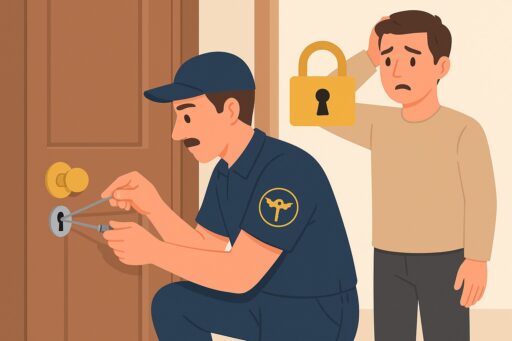When you’re locked out of your home or car, you don’t have time to gamble on a random locksmith. But not all locksmiths are created equal — and some are outright scams. Here’s how to make sure you hire a licensed, reliable, and professional locksmith in Florida that you can actually trust.
1. Insurance Coverage for Locksmith Services
Homeowners insurance policies may cover locksmith services in specific situations, such as lost or stolen keys, or damage resulting from a break-in. Reviewing your policy details and consulting with your insurance provider to understand the extent of coverage could end up saving you on locksmith services or lock changes.
In case your insurance does cover lost house keys or locksmith services, ensure you document the incident appropriately. This may involve obtaining a detailed invoice from your local professional locksmith to submit with your insurance claim.
2. Start Local
Search for locksmiths in your area — not generic 1-800 numbers. Stick with providers who are actually based in your city. If you’re in Coral Gables, Davie, Miramar or anywhere in South Florida, look for a locksmith with a local real phone number.
3. Check for a License (Florida Requires It)
Florida law requires locksmiths to be licensed. Always ask for their license number, and verify it through the state’s database if needed.
4. Read Recent Reviews
Look beyond just star ratings. Read the reviews on Google or Yelp — are they recent? Do they mention quick response times, fair pricing, or specific techs?
5. Ask What Services They Offer
Some locksmiths specialize in residential only, while others handle car lockouts, key fobs, smart locks, or commercial systems. Make sure they match your specific need, feel free to ask questions, seek references, or verify credentials without hesitation. A legitimate locksmith will gladly provide the information to put your mind at ease, like US Locksmith which offers all those services.
6. Confirm Insurance
A professional locksmith should carry liability insurance. This protects you if they accidentally damage your door, lock, or vehicle.
7. Inquire About Subcantractors
Some locksmith companies may use subcontractors. It’s advisable to ask if the locksmiths are direct employees or subcontracted, ensuring they meet the same standards and qualifications as the locksmith company itself.
8. Get a Clear Estimate Upfront
Always ask for a written estimate before any work begins. This should include all potential fees — labor, travel, parts, and emergency surcharges if applicable. Ask for the estimate to be in writing so you’re not reliant on word of mouth.
9. Assess Professionalism and Presentation
Observing the locksmith’s professionalism, such as arriving in a marked vehicle, wearing a uniform, and carrying proper identification, can provide assurance of their legitimacy.
10. Ask About Response Time
If it’s an emergency, time is of the essence. A reliable locksmith should be punctual, give you an honest ETA, not say “20 minutes” and show up an hour later.
11. Request ID(s) from the Locksmith(s)
When the locksmith(s) arrive, they should be able to show ID and company credentials. If they don’t or won’t, that’s a red flag.
12. Expect to Show Your Own ID
A trustworthy locksmith will ask you to show ID to confirm you live or work at the property. If they don’t, they’re cutting corners… or worse.
13. Trust Your Gut
If something feels off — strange pricing, evasive answers, or lack of professionalism — walk away and call someone else.
Extra Tips against Scammers:
1. Do Your Research
One method to prevent falling victim to a locksmith scam is by conducting research on your prospective locksmith. Seek out companies with reviews and an established track record. Review their website, social media presence and feedback from platforms like Yelp or Google Reviews.
2. A Locksmith By Any Other Name
Verify the business name of the locksmith company you contact. Scammers often use names like “Locksmith Services” or “Locksmith Near Me”, rather tahn specific business titles. When calling a locksmith in South Florida, pay attention to how they answer the phone; reputable professionals will identify themselves by their company name.
When someone greets you vaguely it’s a good indication to ask for the name of their business and double check it. This simple step can help you steer clear of scummy scammers.
2. Opt for Non Cash Payments
Thieving scammers often push for cash transactions due to its untraceable nature. A reliable locksmith in Palm Beach, Miramar, or anywhere else in South Florida should accept payment methods such as credit cards, checks, and online payments. Using a credit card adds another layer of security as you can dispute the transaction withy our credit card company if issues arise.
Final Tip: Don’t Wait Until You’re Locked Out
The worst time to find a locksmith is when you’re in a panic. Research ahead of time, save a trusted provider’s number in your phone, and you’ll thank yourself later.
Whether you’re in Coral Gables, Davie, Miramar or anywhere else in Florida US Locksmith offers 24/7 emergency service with licensed professionals and honest pricing. Read all about why you should choose US locksmith for your next locksmith emergency.
Want to know more? Make sure to read more about us, reach out with some questions, or check out the most frequently asked questions.

